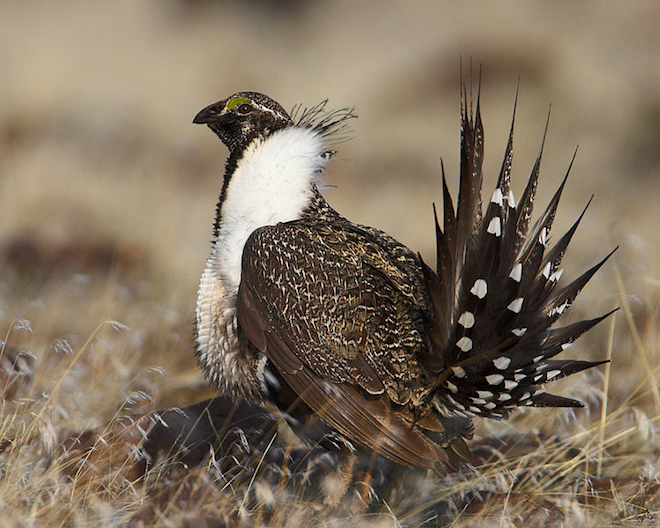Can the second session of the 113th U.S. House of Representatives be any more harmful to wildlife and the environment than the first session of 2013? It appears that they can! On January 3, 2014, the U.S. House of Representatives convened to start its second session of the 113th Congress. By the end of the first week of February the House had embarked on what the National Audubon Society and several other environmental groups consider a War on Wildlife.
Under consideration were three severe anti-wildlife bills, covering a wide range of issues that would impact species protection under the Endangered Species Act (ESA), undermine National Environmental Policy Act (NEPA) safeguards, and cripple key restoration programs.
Unsportsmanlike Conduct
Under the guise of expanding hunting and fishing access on public lands, H.R. 3590, so-called “sportsman’s legislation,” undermines the Wilderness Act and environmental reviews on national wildlife refuges. This bill would permanently exempt all national wildlife refuge management decisions from review and public disclosure under the National Environmental Policy Act. In one fell swoop, this exemption would waive environmental reviews for the entire National Wildlife Refuge System, an enormous and dangerous loophole that would have tremendous consequences for hundreds of imperiled species on more than 150 million acres of federal land and water. The bill could also be interpreted to authorize activities currently prohibited in Wilderness, including the use of mechanized equipment and construction of temporary roads and permanent structures.
Gutting Environmental Protections
H.R. 3964 is a radical and unjustified response to California drought that is intended to override Endangered Species Act (ESA) protections in the Bay-Delta and shut down the San Joaquin River Restoration Program. The bill uses the drought to attack these important programs and make them scapegoats for the water crisis in California. In fact, this bill would dramatically weaken or eliminate federal laws protecting salmon and other native fish in California, which protect thousands of fishing jobs in California and Oregon and protect water quality for Delta farmers. The bill would also gut the San Joaquin River Restoration Program, an important habitat and wildlife restoration project. Existing restrictions are not in place because of the ESA and waiving them will not make it rain.
Irresponsible Lands Management
H.R. 2954 includes a number of environmentally destructive public lands bills, including ones that would overturn existing wildlife conservation protections at Cape Hatteras National Seashore (HR. 819) and eliminate or delay timely reviews of grazing leases necessary to ensure sound conservation of species like the imperiled greater sage-grouse (HR. 657). The bill would overturn a multi-year National Park Service process at the National Seashore that balances the economic health of the region and the conservation and recovery of threatened piping plover shorebirds and endangered nesting sea turtles. The bill’s grazing provisions would prohibit public protest of grazing decisions and frustrate the ability of the Bureau of Land Management and the U.S. Forest Service to implement new conservation measures under consideration as part of their joint National Greater Sage-Grouse Planning Strategy. This bill also accelerates salvage logging in the Rim Fire burn area, putting numerous species at risk.
While all three of these potentially harmful bills passed the House, none are expected to move through the Senate without significant reform. For instance, Senator Feinstein (D-CA) has introduced her own Sacramento-San Joaquin bill to address the serious drought issues in the state, but does so without taking it out on wildlife and other environmental concerns. Don’t let this week become the worst yet for wildlife—call your member of Congress today and tell them to oppose all three bills.
References: National Audubon Society Action Alert, National Wildlife Federation











Comments on this entry are closed.
Larry, thanks so much for posting this. I wish I could say I’m stunned. But it seems the norm now that these reps get elected with a clear agenda to benefit extractive industries, but manage to bamboozle their constituents with diversionary issues.
On the California drought/water issue, one important and under-reported facet is fracking. I’ve read several pieces now addressing the immense burden that fracking in California puts on our water stores. Not only is it a natural disaster in the making, with pollution and chemical issues, but the amount of water used to frack is astronomical.
Then, you have agriculture which uses more than 90 percent of California’s water but it’s “too expensive” to install water-saving drip irrigation systems and so forth. Yeah, let’s blame restoration and wildlife programs, that’s the problem. And let’s have urbanites using just 5 percent of the water supply, take shorter showers.
There’s a reason the founding fathers considered the press an important facet of an open government. Our press, too often beholden to the wrong interests, so clearly fails to present issues candidly and with an eye to the moneyed corruption that drives so many of these policies. If everything were presented as it were, the subterfuge that goes on behind these bills would have no chance in hell with an informed and educated populace.
I can’t believe this. This planet is so overpopulated that there’s just not room for wildlife anymore. The drought may be there, but how big are families getting? More people, more consumption and exploitation of resources. What’s going on is not only climatic but an increase in human population growth and lack of education in birth control practices, as well as the lack of information of alternative energy resources.
Larry, thank you for the updates on this proposed legislation. We all need to be more vigilant than ever to help ensure the survival of ALL species!
Picture this — appalling: http://imgs.xkcd.com/comics/land_mammals.png